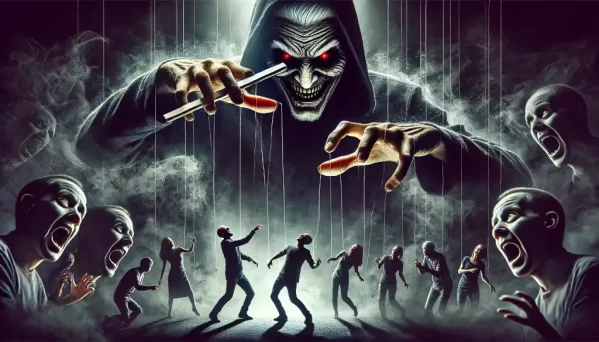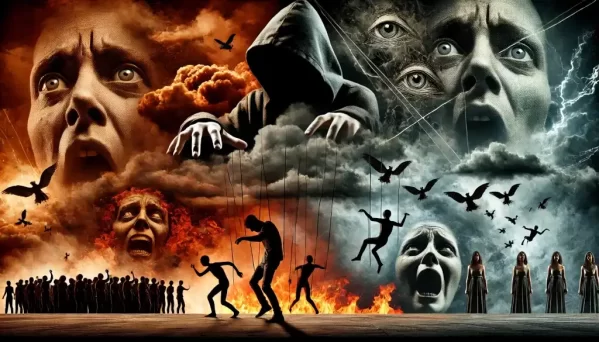Understanding Demonization
Demonization is a powerful and insidious tactic used to vilify individuals or groups, painting them as inherently evil or malicious. This practice has deep historical roots and continues to shape modern society in significant ways. We can work towards a more empathetic and inclusive world by understanding what demonization entails, recognizing its impact, and promoting critical thinking.
Table of Contents
- What Does Demonizing Someone Mean?
- Demonizing Political Opponents
- Current U.S. Examples of Demonization
- The Consequences of Fear Mongering
- Breaking the Cycle of Demonization
- Conclusion
- FAQs
What Does Demonizing Someone Mean?
The verb “demonize” means misrepresenting someone or something as thoroughly evil or vile. This term also extends to suggesting that someone is under the demonic influence of demonic forces. It is important to note how quickly one can instantly demonize a person or group, often without substantial evidence. Historically, demonization has been used to marginalize and dehumanize various groups, often to consolidate power or justify oppressive actions.
Demonization has roots in religious, cultural, and political contexts. For instance, the Christian church has historically been accused of demonizing the Wiccan faith, portraying it as inherently evil to maintain religious dominance.

Demonizing Minority Groups
Demonizing minority groups perpetuates stereotypes and fuels hate speech, leading to severe societal consequences. Common examples that demonize minority groups include:
- Portraying All Muslims as terrorists: This harmful stereotype has contributed to widespread Islamophobia, discrimination, and violence against Muslim communities.
- Demonize Muslims: This contributes to Islamophobia by reinforcing negative stereotypes and fostering an environment of fear and mistrust.
- Depicting racial groups negatively: Stereotypes about African Americans, Hispanics, and other racial minorities lead to systemic racism and discrimination.
- Media portrayal: The media plays a significant role in shaping public perception, and biased reporting can exacerbate the demonization of minority groups, portraying them as societal threats.
The consequences of such demonization include increased prejudice, social division, and even violence against these groups.
Demonizing Political Opponents
Demonizing political opponents’ strategies used to mobilize voters and undermine opposition. This involves portraying opponents as fundamentally evil or uncaring, which can polarize public opinion and stifle constructive political discourse. The tactic of attacking the person to deflect from the message.
- Partisan Politics: Demonizing opponents contributes to extreme partisanship, where compromise becomes difficult and political discourse turns hostile.
- Attacking Law Enforcement: This tactic is used to undermine trust in law enforcement agencies, portraying them as corrupt or oppressive to erode public confidence.
- War and Conflict: Demonizing the enemy is a common tactic in wartime propaganda, used to justify aggression and rally support for military action.
This approach can lead to a lack of critical thinking and empathy among the populace, further entrenching divisions and hindering collaborative problem-solving.
Current Examples
1. The 2020 Presidential Election and Its Aftermath
Claims of Election Fraud
After the 2020 Presidential Election, supporters of then-President Donald Trump propagated claims of widespread election fraud. Trump and his allies demonized Democratic officials and election workers, alleging that they were part of a vast conspiracy to steal the election. This rhetoric led to increased mistrust in the electoral process and culminated in the January 6, 2021, Capitol riot.
2. Vaccine Mandates and Public Health Measures
Anti-Vaccine Rhetoric
Throughout the COVID-19 pandemic, political figures and commentators have demonized public health officials and political opponents advocating for vaccine mandates and other health measures. Some right-wing media personalities and politicians have labeled these measures as authoritarian and accused proponents of infringing on personal freedoms. This demonization has contributed to vaccine hesitancy and polarization over public health strategies.
3. Immigration Policy Debates
Characterizing Political Opponents as “Open Borders” Advocates
In debates over immigration policy, some political figures have demonized opponents by labeling them as proponents of “open borders,” suggesting that they support unrestricted immigration that threatens national security. This framing is used to portray opponents as irresponsible and dangerous, stoking fear among constituents.
4. Climate Change Policy and Green New Deal
Accusations of Socialism and Economic Ruin
Politicians advocating for climate change policies, such as the Green New Deal, have been demonized by opponents who accuse them of promoting socialism and leading the country to economic ruin. This rhetoric is used to undermine environmental initiatives and portray advocates as radical and out-of-touch with economic realities.
5. Supreme Court Nominations
Character Assassination During Confirmation Hearings
Supreme Court nominations have become highly contentious, with nominees often being demonized by political opponents. Women, in particular, are frequently demonized during confirmation hearings, facing unjust criticism and attacks.
For example, during the confirmation hearings of Justice Brett Kavanaugh, Democrats and Republicans engaged in intense character assassination and partisan rhetoric, reflecting deep political divisions and the demonization of the opposing side.
Demonizing political opponents is a pervasive tactic in contemporary U.S. politics. It involves framing opponents in extreme and negative terms to mobilize support and discredit the opposition.
This approach contributes to polarization, erodes trust in democratic institutions, and hampers constructive political discourse. Recognizing and addressing these tactics is crucial for fostering a healthier political environment.

Historic U.S. Examples of Demonization
The Red Scare (1917-1920, 1947-1957)
During the early 20th century, the United States experienced two significant periods of intense anti-communist sentiment known as the Red Scare. The first Red Scare followed the Russian Revolution of 1917 and was characterized by widespread fear of Bolshevism and anarchism. The government conducted raids and deportations of suspected radicals, often violating civil liberties in the process.
The second Red Scare occurred after World War II and was led by Senator Joseph McCarthy. This period was marked by the fear of communist infiltration in the U.S. government and other institutions. Many individuals were blacklisted, lost their jobs, or were imprisoned based on dubious accusations of communist affiliations.
Japanese Internment Camps (1942-1945)
Following the attack on Pearl Harbor in 1941, President Franklin D. Roosevelt signed Executive Order 9066, which authorized the forced relocation and internment of over 120,000 Japanese Americans. They were demonized as potential threats to national security, despite a lack of evidence supporting such claims. The internment camps were a stark violation of civil liberties, driven by wartime hysteria and racial prejudice.
Current U.S. Examples of Demonization
Demonize Muslims Post-9/11
After the September 11, 2001 terrorist attacks, Muslims in the United States faced increased discrimination and hate crimes. The portrayal of Muslims as terrorists became prevalent in media and political discourse. This demonization has led to widespread fear, prejudice, and policies such as the Patriot Act, which expanded government surveillance and security measures often targeting Muslim communities.
Partisan Politics and Demonization
In recent years, the political landscape in the United States has become increasingly polarized. Political opponents are frequently demonized, and depicted as threats to democracy, morality, and national security.
This can be seen in the rhetoric surrounding major political events and figures, such as the contentious 2020 Presidential Election. In the run-up to the 2024 Presidential elections, major political parties have engaged in demonizing tactics to mobilize their bases and discredit their opponents.
Immigration and Demonization of Immigrants
Immigrants, particularly those from Latin America, have been frequently demonized in U.S. political discourse. They are often depicted as criminals, drug traffickers, and threats to the American way of life. This rhetoric has been used to justify stringent immigration policies, including family separations at the border and the construction of a border wall.
Demonization has been a recurring tactic in U.S. history, used to marginalize and oppress various groups. Whether driven by fear, prejudice, or political gain, the consequences of demonization are profound, leading to social division, discrimination, and violence. By understanding these historical and current examples, we can better recognize and challenge such harmful practices, promoting a more inclusive and empathetic society.
The Consequences of Fear Mongering
Fear-mongering and demonization are closely linked tactics used to manipulate public opinion and maintain social control. By instilling fear and distrust in own voters, these practices can:
- Attack Law Enforcement and Political Opposition: Demonizing certain groups can justify repressive measures and curtail civil liberties.
- Erode Empathy: When individuals or groups are consistently portrayed as threats, it becomes challenging to view them with empathy or understanding.
- Fuel Violence and Aggression: The social consequences of fear-mongering can be severe, leading to hate crimes, social unrest, and even genocidal actions.
Breaking the Cycle of Demonization
To combat the harmful effects of demonization, it is essential to promote critical thinking and empathy. This involves:

- Reevaluating Demonized Groups: Encouraging a reexamination of prejudices against women, minorities, and other marginalized groups to foster greater understanding and empathy.
- Encouraging Open-mindedness: Promoting a culture of open-mindedness and dialogue, where diverse perspectives are valued and respected.
- Critical Media Consumption: Educating the public to critically evaluate media messages and question biased or sensationalist reporting.
Conclusion
Demonization is a deeply ingrained practice with far-reaching consequences. By understanding its mechanisms and impacts, we can work towards dismantling the narratives that perpetuate fear and division. Promoting critical thinking, empathy, and open dialogue are crucial steps in breaking the cycle of demonization and building a more inclusive society.
By fostering these qualities, we can work towards a more inclusive and accepting society.
FAQs
What does demonizing someone mean?
Demonizing someone means misrepresenting them as inherently evil or morally reprehensible, often to marginalize or oppress them.
What is an example of demonizing?
An example of demonizing is portraying a political opponent as a threat to national security without substantive evidence, to manipulate public opinion against them.
What is a synonym for demonizing?
A synonym for demonizing is “vilifying.”
What is demonizing in psychology?
In psychology, demonizing refers to the cognitive process where individuals or groups are dehumanized and perceived as fundamentally evil, often leading to social ostracism or persecution.
What does it mean to demonize a person?
To demonize a person means to portray them as evil or malevolent, often without justification, to elicit fear or hatred towards them.
How do you use demonized in a sentence?
“The politician was demonized by the media, which depicted him as a threat to national security despite the lack of evidence.”
Sources Used For This Article:
- “False claim that federal agency revealed fraud in 2020 presidential election | Fact check
- “Fox News Hosts Smear Covid Vaccine, Despite Outbreaks” The New York Times.
- How Joe Biden and Donald Trump’s border policies compare BBC
- “Brett Kavanaugh and allegations of sexual misconduct: The complete list.
- “Red Scare.” History.com.
- Senate Blocks Green New Deal, But Climate Change Emerges As Key 2020
- “Islamophobia and Its Impact in the United States.” GALLUP
- “The Polarization of the American Public.” Pew Research Center.
- “Japanese-American Internment.” National Archives.
- “Immigrant Stereotypes and Public Opinion.” Brookings.

I’ve recently started a site, the information you provide on this web site has helped me tremendously. Thanks for all of your time & work.